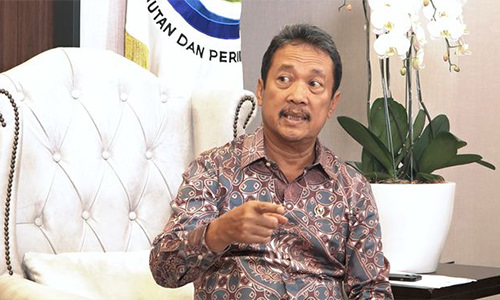NEWS
BACK

Minister of Marine Affairs and Fisheries Sakti Wahyu Trenggono Invites the Public to Protect the Fisheries Ecosystem to Strengthen Sustainable Food Security Amid Global Food Crisis Threats
Minister of Marine Affairs and Fisheries Sakti Wahyu Trenggono invites the public to jointly protect the fisheries ecosystem to strengthen a sustainable food security system amid the threat of a global food crisis. A healthy ecosystem will continuously produce quality fishery products for public consumption.Protecting the fisheries ecosystem can be done in various ways. Trenggono gave examples such as wisely managing waste so it doesn't pollute rivers and seas, avoiding destructive fishing methods, and supporting the conservation of fisheries ecosystems by not damaging coral reefs, mangroves, and seagrass beds or catching protected species.He acknowledged that the Ministry of Marine Affairs and Fisheries (KKP) has strategies to maintain the health of marine and fishery resources ecosystems, packaged into five blue economy priority programs. These include expanding conservation areas, implementing a quota-based measured fishing policy, developing sustainable aquaculture, monitoring and controlling all activities in coastal areas and small islands, and organizing a national movement for marine litter cleanup."The blue economy program not only sees the potential of the marine sector as an economic commodity but also emphasizes the importance of preserving marine ecosystems," Trenggono said.Minister Trenggono added that preserving the fisheries ecosystem means ensuring the sustainability of fish populations as a food source, and it is also a step towards providing quality and sustainable fishery products to the public.During the commemoration of the 10th National Fish Day (Harkannas) in 2023, Minister Trenggono reminded that Indonesia is approaching its centennial with a demographic bonus of 70 percent of the productive-age population. This population must be well-prepared to form a golden generation, an excellent Indonesian generation with noble character, high competence, and productivity."We face a demographic bonus in the future, and it is also a challenge to create a strong and intelligent future generation to meet these challenges," he said.Minister Trenggono also noted that fish, with all its benefits, is a food source that will be our mainstay in the future, considering that more than 70% of Indonesia's territory is water. Moreover, to support downstream policies, reduce stunting rates, and implement a blue economy through zero-waste fishery processing, the application of Fish Protein Hydrolysate technology is one alternative in developing protein fortification in food raw materials, such as biscuits, milk, bread, noodles, and others. This is an effective way to provide nutrients to the public without drastically changing eating habits.At the peak of the 10th National Fish Day celebration, Minister Trenggono also invited the public to regularly consume fish, which is good for immunity and children's intelligence. Fish can be easily processed into various local and international menus according to taste.As information, the peak celebration of the 10th National Fish Day with the theme "Fish for the Golden Generation" at Lapangan Banteng featured various activities promoting fish consumption to the public. These included affordable and healthy fish bazaars, fish culinary events with participants from 29 provinces, fish-eating campaigns for hundreds of elementary school children, free fish meals, and fish-based cooking competitions. The event also launched the Year of Indonesian Tuna 2024, recognizing Indonesia as the world's largest tuna producer. Through this launch, it is hoped that the synergy and collaboration of all stakeholders will further strengthen market access and benefits, both for the Indonesian public and the global community.
